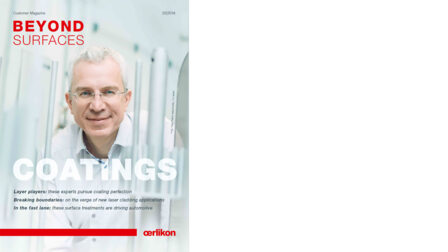“The surface is always a complex matter because it is subject to so many influences”. In the latest edition of BEYOND SURFACES, Professor Paul Mayrhofer at TU Wien explains why this was a challenge even for renowned physicists such as Wolfgang Pauli – and demonstrates the best way to tackle the problem together with other experts in the field of surface technologies.
Find out how these technologies help make our cars faster and use resources more sparingly. And how customers around the globe rely on our solutions to create more efficient and sustainable production methods. In addition, our expert Dr. Arkadi Zikin talks about the new applications of this technology and presents a brand new research project with ETH Zurich. Immerse yourself in the fascinating world of coatings.






































